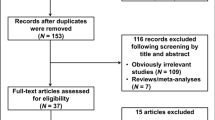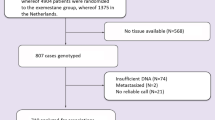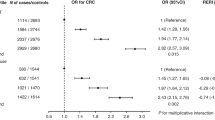Abstract
Estrogen has been shown not only to reduce the incidence of colorectal cancer but also gastric cancer (GC). Polymorphisms in estrogen receptor β gene, ESR2, correlate with colorectal cancer survival. To better understand the role of ESR2 in GC, genomic DNA extracted from 169 Japanese patients and 172 patients from Los Angeles County (LAC) was analyzed for association of overall survival (OS) with three ESR2 polymorphisms, which are of biological significance using multivariable Cox proportional hazard regression. ESR2 rs1271572 (C>A) and rs3020443 (T>G) had univariate and multivariable associations with OS in the Japanese cohort, whereas the C allele of ESR2 rs2978381 (T>C) predicted favorable OS in the Japanese cohort but worse OS in the LAC cohort. The interaction term of the ESR2 rs2978381 and cohort group reached statistical significance. Our study provides evidence that genetic variations in ESR2 gene are significantly associated with survival in patients with locally advanced GC.
This is a preview of subscription content, access via your institution
Access options
Subscribe to this journal
Receive 6 print issues and online access
$259.00 per year
only $43.17 per issue
Buy this article
- Purchase on Springer Link
- Instant access to full article PDF
Prices may be subject to local taxes which are calculated during checkout

Similar content being viewed by others
References
Zhao C, Lam EW, Sunters A, Enmark E, De Bella MT, Coombes RC et al. Expression of estrogen receptor beta isoforms in normal breast epithelial cells and breast cancer: regulation by methylation. Oncogene 2003; 22: 7600–7606.
Saville B, Wormke M, Wang F, Nguyen T, Enmark E, Kuiper G et al. Ligand-, cell-, and estrogen receptor subtype (alpha/beta)-dependent activation at GC-rich (Sp1) promoter elements. J Biol Chem 2000; 275: 5379–5387.
Rose DP, Vona-Davis L . Interaction between menopausal status and obesity in affecting breast cancer risk. Maturitas 2010; 66: 33–38.
Castiglione F, Taddei A, Rossi Degl'Innocenti D, Buccoliero AM, Bechi P, Garbini F et al. Expression of estrogen receptor beta in colon cancer progression. Diagn Mol Pathol 2008; 17: 231–236.
Evans DM, Cardon LR . A comparison of linkage disequilibrium patterns and estimated population recombination rates across multiple populations. Am J Hum Genet 2005; 76: 681–687.
Lin PI, Vance JM, Pericak-Vance MA, Martin ER . No gene is an island: the flip-flop phenomenon. Am J Hum Genet 2007; 80: 531–538.
Peek RM Jr, Blaser MJ . Helicobacter pylori and gastrointestinal tract adenocarcinomas. Nat Rev Cancer 2002; 2: 28–37.
Uemura N, Okamoto S, Yamamoto S, Matsumura N, Yamaguchi S, Yamakido M et al. Helicobacter pylori infection and the development of gastric cancer. N Engl J Med 2001; 345: 784–789.
Hartz A, He T, Ross JJ . Risk factors for colon cancer in 150,912 postmenopausal women. Cancer Causes Control 2012; 23: 1599–1605.
Suerbaum S, Michetti P . Helicobacter pylori infection. N Engl J Med 2002; 347: 1175–1186.
Hildebrand JS, Jacobs EJ, Campbell PT, McCullough ML, Teras LR, Thun MJ et al. Colorectal cancer incidence and postmenopausal hormone use by type, recency, and duration in cancer prevention study II. Cancer Epidemiol Biomarkers Prev 2009; 18: 2835–2841.
El-Omar EM, Carrington M, Chow WH, McColl KE, Bream JH, Young HA et al. Interleukin-1 polymorphisms associated with increased risk of gastric cancer. Nature 2000; 404: 398–402.
de Bruin WC, Wagenmans MJ, Board PG, Peters WH . Expression of glutathione S-transferase theta class isoenzymes in human colorectal and gastric cancers. Carcinogenesis 1999; 20: 1453–1457.
Moon YW, Park S, Sohn JH, Kang DR, Koo JS, Park HS et al. Clinical significance of progesterone receptor and HER2 status in estrogen receptor-positive, operable breast cancer with adjuvant tamoxifen. J Cancer Res Clin Oncol 2011; 137: 1123–1130.
De Laurentiis M, Arpino G, Massarelli E, Ruggiero A, Carlomagno C, Ciardiello F et al. A meta-analysis on the interaction between HER-2 expression and response to endocrine treatment in advanced breast cancer. Clin Cancer Res 2005; 11: 4741–4748.
Yang Z, Barnes CJ, Kumar R . Human epidermal growth factor receptor 2 status modulates subcellular localization of and interaction with estrogen receptor alpha in breast cancer cells. Clin Cancer Res 2004; 10: 3621–3628.
Chan JA, Meyerhardt JA, Chan AT, Giovannucci EL, Colditz GA, Fuchs CS . Hormone replacement therapy and survival after colorectal cancer diagnosis. J Clin Oncol 2006; 24: 5680–5686.
Matsuyama S, Ohkura Y, Eguchi H, Kobayashi Y, Akagi K, Uchida K et al. Estrogen receptor beta is expressed in human stomach adenocarcinoma. J Cancer Res Clin Oncol 2002; 128: 319–324.
Sun YH, Yang B, Wang XH, Xu CL, Gao XF, Gao X et al. Association between single-nucleotide polymorphisms in estrogen receptor beta gene and risk of prostate cancer. Zhonghua wai ke za zhi [Chinese journal of surgery] 2005; 43: 948–951.
Wang M, Pan JY, Song GR, Chen HB, An LJ, Qu SX . Altered expression of estrogen receptor alpha and beta in advanced gastric adenocarcinoma: correlation with prothymosin alpha and clinicopathological parameters. Eur J Surg Oncol 2007; 33: 195–201.
Guo JL, Xu CY, Jiang ZN, Dong MJ, Xie SD, Shen JG et al. Estrogen receptor beta variants mRNA expressions in gastric cancer tissues and association with clinicopathologic parameters. Hepatogastroenterology 2010; 57: 1584–1588.
Xu CY, Guo JL, Jiang ZN, Xie SD, Shen JG, Shen JY et al. Prognostic role of estrogen receptor alpha and estrogen receptor beta in gastric cancer. Ann Surg Oncol 2010; 17: 2503–2509.
Ryu WS, Kim JH, Jang YJ, Park SS, Um JW, Park SH et al. Expression of estrogen receptors in gastric cancer and their clinical significance. J Surg Oncol 2012; 106: 456–461.
Theodoropoulos GE, Lazaris AC, Panoussopoulos D, Davaris P, Golematis BC . Significance of estrogen receptors and cathepsin D tissue detection in gastric adenocarcinoma. J Surg Oncol 1995; 58: 176–183.
Matsui M, Kojima O, Kawakami S, Uehara Y, Takahashi T . The prognosis of patients with gastric cancer possessing sex hormone receptors. Surg Today 1992; 22: 421–425.
Woo IS, Park MJ, Choi SW, Kim SJ, Lee MA, Kang JH et al. Loss of estrogen receptor-alpha expression is associated with hypermethylation near its ATG start codon in gastric cancer cell lines. Oncol Rep 2004; 11: 617–622.
Chandanos E, Rubio CA, Lindblad M, Jia C, Tsolakis AV, Warner M et al. Endogenous estrogen exposure in relation to distribution of histological type and estrogen receptors in gastric adenocarcinoma. Gastric Cancer 2008; 11: 168–174.
Karat D, Brotherick I, Shenton BK, Scott D, Raimes SA, Griffin SM . Expression of oestrogen and progesterone receptors in gastric cancer: a flow cytometric study. Br J Cancer 1999; 80: 1271–1274.
Singh S, Poulsom R, Wright NA, Sheppard MC, Langman MJ . Differential expression of oestrogen receptor and oestrogen inducible genes in gastric mucosa and cancer. Gut 1997; 40: 516–520.
Hogan AM, Collins D, Baird AW, Winter DC . Estrogen and gastrointestinal malignancy. Mol Cell Endocrinol 2009; 307: 19–24.
Maguire P, Margolin S, Skoglund J, Sun XF, Gustafsson JA, Borresen-Dale AL et al. Estrogen receptor beta (ESR2) polymorphisms in familial and sporadic breast cancer. Breast Cancer Res Treat 2005; 94: 145–152.
Frise S, Kreiger N, Gallinger S, Tomlinson G, Cotterchio M . Menstrual and reproductive risk factors and risk for gastric adenocarcinoma in women: findings from the canadian national enhanced cancer surveillance system. Ann Epidemiol 2006; 16: 908–916.
Passarelli MN, Phipps AI, Potter JD, Makar KW, Coghill AE, Wernli KJ et al. Common single-nucleotide polymorphisms in the estrogen receptor beta promoter are associated with colorectal cancer survival in postmenopausal women. Cancer Res 2013; 73: 767–775.
Wu AH, Wan P, Bernstein L . A multiethnic population-based study of smoking, alcohol and body size and risk of adenocarcinomas of the stomach and esophagus (United States). Cancer Causes Control 2001; 12: 721–732.
Gönen M, Heller G . Concordance probability and discriminatory power in proportional hazards regression. Biometrika 2005; 92: 965–970.
Li LC, Yeh CC, Nojima D, Dahiya R . Cloning and characterization of human estrogen receptor beta promoter. Biochem Biophys Res Commun 2000; 275: 682–689.
Li LC, Chui R, Nakajima K, Oh BR, Au HC, Dahiya R . Frequent methylation of estrogen receptor in prostate cancer: correlation with tumor progression. Cancer Res 2000; 60: 702–706.
Suzuki F, Akahira J, Miura I, Suzuki T, Ito K, Hayashi S et al. Loss of estrogen receptor beta isoform expression and its correlation with aberrant DNA methylation of the 5'-untranslated region in human epithelial ovarian carcinoma. Cancer Sci 2008; 99: 2365–2372.
Risk M-GCoGSfMHTRBC. Polymorphisms in genes of the steroid receptor superfamily modify postmenopausal breast cancer risk associated with menopausal hormone therapy. Int J Cancer 2010; 126: 2935–2946.
Chen L, Liang Y, Qiu J, Zhang L, Chen X, Luo X et al. Significance of rs1271572 in the estrogen receptor beta gene promoter and its correlation with breast cancer in a southwestern Chinese population. J Biomed Sci 2013; 20: 32.
Treeck O, Elemenler E, Kriener C, Horn F, Springwald A, Hartmann A et al. Polymorphisms in the promoter region of ESR2 gene and breast cancer susceptibility. J Steroid Biochem Mol Biol 2009; 114: 207–211.
Thellenberg-Karlsson C, Lindstrom S, Malmer B, Wiklund F, Augustsson-Balter K, Adami HO et al. Estrogen receptor beta polymorphism is associated with prostate cancer risk. Clin Cancer Res 2006; 12: 1936–1941.
Shah MA, Khanin R, Tang L, Janjigian YY, Klimstra DS, Gerdes H et al. Molecular classification of gastric cancer: a new paradigm. Clin Cancer Res 2011; 17: 2693–2701.
Blot WJ, Devesa SS, Kneller RW, Fraumeni JF Jr . Rising incidence of adenocarcinoma of the esophagus and gastric cardia. JAMA 1991; 265: 1287–1289.
Crew KD, Neugut AI . Epidemiology of gastric cancer. World J Gastroenterol 2006; 12: 354–362.
Camargo MC, Goto Y, Zabaleta J, Morgan DR, Correa P, Rabkin CS . Sex hormones, hormonal interventions, and gastric cancer risk: a meta-analysis. Cancer Epidemiol Biomarkers Prev 2012; 21: 20–38.
Wu AH, Stanczyk FZ, Seow A, Lee HP, Yu MC . Soy intake and other lifestyle determinants of serum estrogen levels among postmenopausal Chinese women in Singapore. Cancer Epidemiol Biomarkers Prev 2002; 11: 844–851.
Kim C, Golden SH, Mather KJ, Laughlin GA, Kong S, Nan B et al. Racial/ethnic differences in sex hormone levels among postmenopausal women in the diabetes prevention program. J Clin Endocrinol Metab 2012; 97: 4051–4060.
Yasui T, Uemura H, Irahara M, Arai M, Kojimahara N, Okabe R et al. Associations of endogenous sex hormones and sex hormone-binding globulin with lipid profiles in aged Japanese men and women. Clinica chimica acta 2008; 398: 43–47.
Vaidya D, Dobs A, Gapstur SM, Golden SH, Cushman M, Liu K et al. Association of baseline sex hormone levels with baseline and longitudinal changes in waist-to-hip ratio: Multi-Ethnic Study of Atherosclerosis. Int J Obes (Lond) 2012; 36: 1578–1584.
Sipponen P, Correa P . Delayed rise in incidence of gastric cancer in females results in unique sex ratio (M/F) pattern: etiologic hypothesis. Gastric Cancer 2002; 5: 213–219.
Derakhshan MH, Liptrot S, Paul J, Brown IL, Morrison D, McColl KE . Oesophageal and gastric intestinal-type adenocarcinomas show the same male predominance due to a 17 year delayed development in females. Gut 2009; 58: 16–23.
Acknowledgements
This study was partly funded by the NIH grant P30CA14089-27S1 and Yvonne Bogdanovich. It was performed in the Sharon A Carpenter Laboratory at University of Southern California/Norris Comprehensive Cancer Center and in memory of David Donaldson. Martin D Berger received a grant from the Swiss Cancer League (BIL KLS-3334-02-2014). Stefan Stremitzer is a recipient of an Erwin Schrödinger fellowship of the Austrian Science Fund (J3501-B13).
Author information
Authors and Affiliations
Corresponding author
Ethics declarations
Competing interests
The authors declare no conflict of interest.
Additional information
Supplementary Information accompanies the paper on the The Pharmacogenomics Journal website
PowerPoint slides
Rights and permissions
About this article
Cite this article
Sunakawa, Y., Cao, S., Berger, M. et al. Estrogen receptor-beta genetic variations and overall survival in patients with locally advanced gastric cancer. Pharmacogenomics J 17, 36–41 (2017). https://doi.org/10.1038/tpj.2015.77
Received:
Revised:
Accepted:
Published:
Issue Date:
DOI: https://doi.org/10.1038/tpj.2015.77



